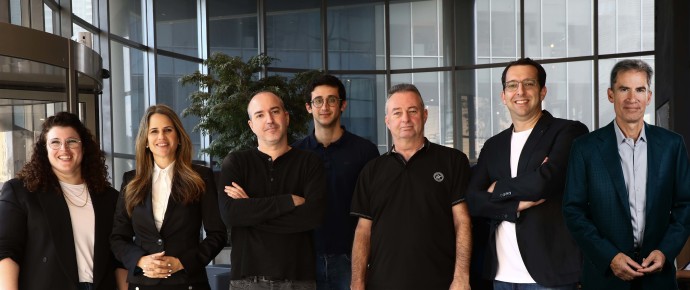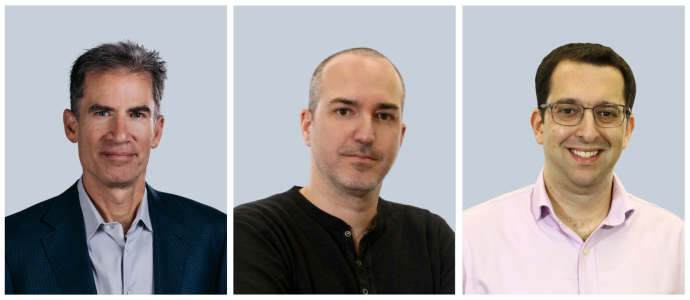‘Our operating model is high-touch,” says Gideon Argov, managing partner at New Era.
The Israel-US venture capital fund recently announced a $140 million second investment fund and is looking toward a third fund to leverage its latest success. New Era’s funds are already valued at more than $500m.
Established in 2017 by Argov and Ran Simha, the fund focuses on early-stage investments in Israeli start-ups that use breakthrough technologies, emphasizing artificial intelligence and machine learning.
“We are in constant contact with our entrepreneurs about the technologies that are being designed, built and implemented,” Argov stresses. “We think that Israeli companies should not be sold prematurely. They need to become established outside Israel to realize their full potential and develop a global reach.
“It is important that they attain this regardless of whether they become public companies. Given the availability of large pools of private capital today, truly innovative and successful tech start-ups will have no difficulty attracting financing.”

New Era’s first fund consisted of $60m. and invested in 10 companies, most of which have achieved a high return on investment, placing its performance within the top 10% of its “vintage” of comparable peers. Two of the companies have already become unicorns (privately owned companies worth more than $1 billion), and two more in the pipeline are on the verge of reaching that level and have been dubbed “soonicorns” by the fund.
Among the prominent companies that participated in the first fund is Papaya Global, which developed payroll management software used by global companies. It began with a $3m. round of funding in 2018 and is valued today at $3.7b.
Another successful company from the first fund is Optibus, which has already raised close to $200m. and will soon become a unicorn, according to estimates. The company has created the first complete operating system of software to control fleets of public transport vehicles around the world.
“Using this platform, municipalities and transport companies can control and monitor all aspects of fleet operation, including routes and timetables, operational constraints, labor utilization and maintenance and repairs. The data that is generated can be used to make real-time changes to all of these parameters,” Argov explains. Optibus crossed the 1,000-city threshold of active customers and expects to continue to scale rapidly.
The companies in which New Era has invested illustrate how AI can benefit society. Argov says this is part of the Environmental, Social and (Corporate) Governance (ESG) orientation, which guides the firm’s investment philosophy.
“These are not impact investments,” he notes, “but they take into account what is happening in the real world and the ability of companies and technology to significantly improve quality of life. Optibus assists in fleet management and lowers carbon emissions. By reducing the number of buses running with low passenger payloads, the company reduced CO2 emissions by an estimated 11 million tons in 2021.
“Alongside profits, it is also essential to us that women and minorities are represented in the companies and that there is a commitment to addressing environmental and social issues.”

The Legacy of Peres
Along with Argov, Boston-based founding partner Ran Simha manages the fund’s office in Israel.
Simha has an extensive résumé in the business world as an investment manager (having worked alongside Sir Ronald Cohen at his UK-based hedge fund) and was a close confidant of the late Shimon Peres, serving as Peres’s economic and technological adviser during his presidency. He also serves as co-chair of the committee that selects the companies presented annually at the Peres Center for Peace and Innovation in Jaffa.
Argov has an impressive business record and, for the past 30 years, served as CEO of multiple US-based multinational industrial technology companies, including Kollmorgen and Entegris. In addition, he is an adviser to Boston-based private equity firm Berkshire Partners and an investor in numerous Israeli technology companies. He served as chairman of banking software company Fundtech and Servotronix, which was sold to Midea, the Chinese electronics giant.
New Era’s second fund raised two-and-a-half times as much as the first fund and also includes companies utilizing groundbreaking technologies making an immediate impact on our lives – with firms in the fields of cybersecurity, financial, HR and insurance technology, digital health and business services.
“If many of the companies reached us via personal connections in the first fund, in the second fund, it is primarily due to our portfolio companies’ achievements,” Simha says. All the investors from the first fund joined the second fund, including Israeli and global institutional investors, large family offices and several founders of global investment funds.
“We understand business and technology. At the same time, it is important to emphasize that those who are responsible for these companies’ success are their founders and leadership teams, who live and breathe their business day and night. We know how to choose the right people, but 99.9% of the success is theirs. We provide financial backing and leverage our professional network to find contacts that our portfolio companies could not otherwise reach as quickly.
“Technology today enables companies to grow and generate higher revenue, faster than ever before,” adds Simha. “Because we understand the technology at a granular level, it gives us an advantage because we know whether it is built properly, both conceptually and operationally.”
“Everyone is competing for the best start-ups,” points out Ayelet Frish, who managed the branding and communications strategy of the late Peres, and today, along with other projects, manages business development for New Era.
“Entrepreneurs choose New Era because of the values and people that make up the fund. They understand the benefits of experience. Our team has had considerable success identifying the critical elements – leadership, technology, a robust business model and a large available market – that are essential for selecting companies with the potential to achieve breakout results.”
A third fund
Together with the significance New Era has placed on environmental and social awareness, the primary reason that New Era’s partners have attracted investors and start-ups is the success of the first fund.
The new fund, which closed recently, has invested in nine companies over the past year and has significantly increased in value. New Era continues to look for ambitious early-stage Israeli start-ups with breakthrough technologies.
Investors in New Era can often enter into co-investments in start-ups that they would not otherwise be able to invest in directly. “Many entities see us as ‘binoculars’ for the Israeli ecosystem,” says Argov, who describes some of the start-ups in which the second fund has invested.
One of the companies involved in digital transformation is Workiz, which provides professional service teams supporting a number of verticals, including locksmiths, electricians, HVAC and elevator repair companies and others, with a digital platform to manage their customers, schedule service, communicate with technicians, transfer payments and create a digital record of each customer engagement.
Another Fund 2 investment is Caja Robotics, which provides autonomous robots and a unique, cloud-based operating system for working in logistics warehouses. Driven by the scarcity and cost of labor as well as the increasing proportion of online fulfillment, warehouse automation continues to grow dramatically.
The Caja solution is unique in its adaptability to a wide array of deployments, both in new “greenfield” warehouses and refitted “brownfield” installations. Caja’s solution can operate with virtually any ceiling height and even on uneven floor surfaces. The entire system is fully software-configurable, meaning that no humans are required to pick the products off the shelves.
“We have a successful model that consists of a firm foothold in Israel, a prominent presence in the US, and key relationships around the world,” Argov explains. “We help companies develop outside of Israel, help to identify and onboard the right people and to create the right strategic partnerships. We help to map out a talent acquisition and operational infrastructure in order to allow even small technology start-ups to operate on a global scale.”
Ziv Conen, who joined the group a year ago as a partner, emphasizes the importance of AI in selecting start-ups. Conen has a rich technological background honed during 10 years of service in the IDF’s prestigious 8200 unit, where he reached the rank of major. He also has extensive experience in the private sector, leading digital transformations for Fortune 500 companies, through his prior role as an associate partner in McKinsey & Company in Boston. Conen emphasizes the importance of using AI to create differentiation through a platform that is difficult for large companies to replicate.
“The future of business lies in AI-based platforms. If you invest enough time developing AI or any other deep-tech technology, it will be much harder for a competitor to do the same. Computing power has increased exponentially. There is more available storage with vastly less expensive costs, and it is possible to create analytics engines that process more information faster and produce more granular and better-quality insights through continuous learning.”
Conen lists one of the leading companies in the second fund – Assured Allies – as an example. It provides platform and AI-based analytics, enabling long-term care insurers to predict which insured individuals within their cohorts are at the highest risk of hospitalization or deterioration, and then alerts the insurer to direct resources – care providers, lifestyle coaches and other personnel – to improve the habits and lifestyles of the potentially impacted individuals and reduce their healthcare risks and the corresponding costs of insuring them.
Changing the face of society
“Israeli start-ups are changing the face of society,” emphasizes Argov, who took on the task of co-managing the fund after meeting with Peres, who wanted to help young entrepreneurs after his presidential term ended. “The fund has a singular mixture that combines a business interest in innovation at a high level with brilliant entrepreneurs who teach you something new every day.
“We have passed the stage where Zionism is exclusively defined as protecting the country and growing agricultural products,” says Argov. “Zionism today is developing the hi-tech economy that led Israel to previously unimaginable growth.
“We want to help build the new Israeli vision, through which we will bridge the gaps in society and link disparate communities from different regions, including the periphery and underprivileged populations. We constantly meet diverse start-ups with Arab and haredi leaders. This is what motivates us to play a small part in building a country that will benefit all its residents while providing attractive returns to our investors.”
Argov, a ninth-generation Sabra originally from Jerusalem, is deeply involved in social issues and established the Argov Program for Leadership and Diplomacy at Reichman University. The program is named after his father, late ambassador Shlomo Argov, who was severely wounded in an assassination attempt in 1982 while serving as Israel’s ambassador to the UK. The program provides students with theoretical knowledge and practical tools and prepares young people with exceptional skills to represent the interests of the State of Israel and the Jewish people in the international arena.
“The idea that motivates us is to invest in companies that tackle some of society’s most complex challenges using AI, machine learning, data mining and self-learning systems,” Argov concludes.
“The ultimate test of our success will be whether our companies can close economic and social gaps in society and improve quality of life as well as create exceptional financial returns for those investors who have entrusted a portion of their capital to us.”
This article was written in cooperation with New Era Capital.
Translated by Alan Rosenbaum.
